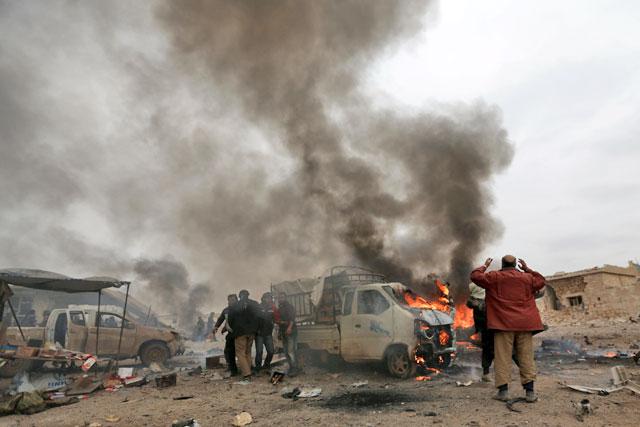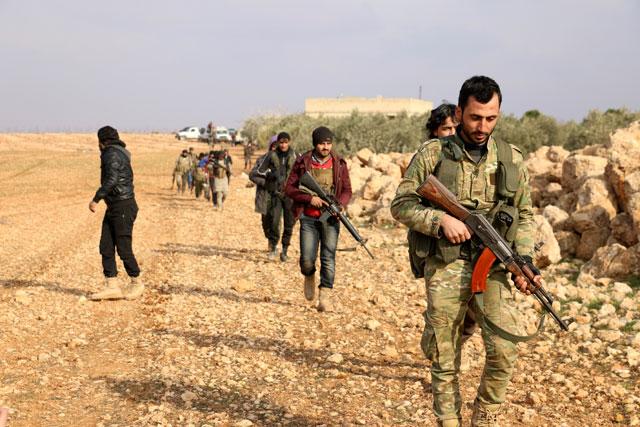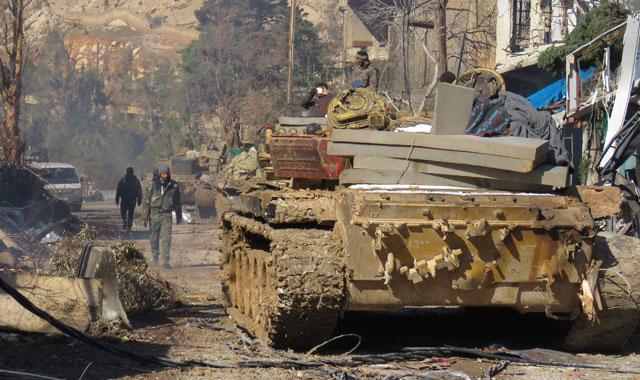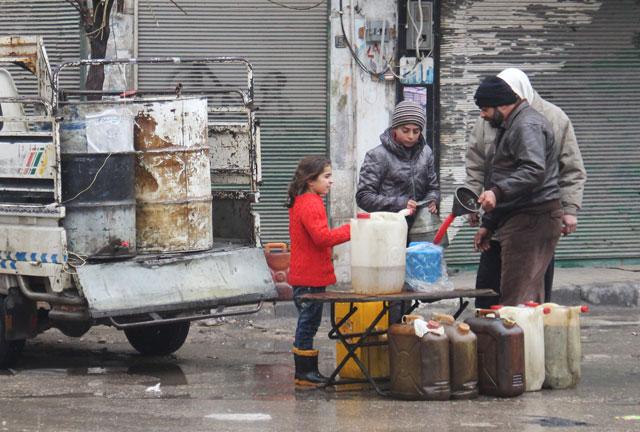You are here
Deadly clashes grip flashpoint area near Syria capital
By AFP - Jan 15,2017 - Last updated at Jan 15,2017

Smoke rises after a car bomb explosion in Jub Al Barazi, east of the northern Syrian town of Al Bab, Syria, on Sunday (Reuters photo)
BEIRUT — Heavy fighting gripped a flashpoint region near Syria's capital on Sunday, leaving seven civilians dead and threatening a nationwide truce designed to pave the way towards peace talks.
Further east, Syrian government troops lost ground to a brutal assault by the Daesh terror group near the key Deir Ezzor military airport.
The escalating violence across Syria in recent days augurs ill for peace negotiations in Kazakhstan later this month.
In the Wadi Barada region northwest of Damascus, fresh clashes broke out between rebel groups and advancing government forces, the Syrian Observatory for Human Rights said.
Regime shelling of the Deir Qanun village killed seven civilians and wounded at least 20 other people, the Britain-based monitor said.
Observatory head Rami Abdel Rahman said it was the "highest toll" there since the nationwide truce came into force on
December 30.
Omar Al Shami, spokesman for the Wadi Barada Media Committee, told AFP shells struck a temporary shelter where displaced women and children had been seeking refuge.
The activist group published gruesome pictures of what it said was the aftermath of the attack, including photographs of blood-stained floors and body parts wrapped in blankets.
Fighting has persisted for weeks in Wadi Barada, which is the main source of water for the capital.
Local officials struck a truce with Syrian authorities on Friday to allow maintenance teams into Wadi Barada to restore water to Damascus, but the deal was called off after chief negotiator Ahmed Al Ghadban was killed the next day.
The two sides accused each other of assassinating the retired army officer, who had only assumed his duties to restore the water supply on Saturday.
“The agreement was considered null this morning after the regime’s multiple violations and especially after the killing of the negotiations official,” Shami said.
Shami told AFP the government’s maintenance workers left Wadi Barada without completing the repairs, leaving 5.5 million in Damascus and its suburbs without water.
An official from Syria’s reconciliation ministry earlier told AFP the local deal in Wadi Barada “had not completely collapsed”.
“We are communicating and pursuing new efforts in parallel with the ongoing military action,” the official said.
Many of Syria’s battlefronts have quieted since the entry into force of the nationwide ceasefire brokered by regime backer Russia and opposition ally Turkey.
The deal excludes Daesh and its jihadist rival, the Fateh Al Sham Front — formerly known as Al Nusra Front.
On Sunday, Daesh militantss edged closer to the key Deir Ezzor military airport, despite heavy air strikes by government warplanes.
The observatory said the raids on Sunday killed five civilians, including two women and two children, in Deir Ezzor.
It was the second day of the extremist group’s brutal assault on regime-held territory around the city, the capital of the oil-rich province by the same name.
The fresh advance came “despite more than 120 air strikes carried out by regime forces on jihadist positions since Saturday morning, in addition to heavy artillery fire”, said Abdel Rahman.
Daesh unleashed a wave of tunnel bombs and suicide attackers against government forces on Saturday, leaving 12 government fighters dead.
Another 20 Daesh militants were killed in the clashes.
The extremist group has lost swathes of territory in northern Syria to Kurdish fighters as well as to a Turkish-backed rebel alliance, but it remains on the offensive in other parts of the country.
In addition to its push in Deir Ezzor, Daesh recently recaptured Palmyra in central Syria from government forces.
Related Articles
BEIRUT — Key rebel group Ahrar Al Sham said on Wednesday it will not take part in peace talks in the Kazakh capital next week aimed at endin
DAMASCUS — The Syrian army said on Sunday that it had recaptured a flashpoint area from rebels near Damascus that supplies water to the capi
BEIRUT — Syria's army advanced on Monday as it battles to capture a rebel region that is key to the capital's water supply, launching strike



















